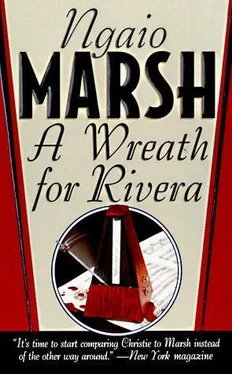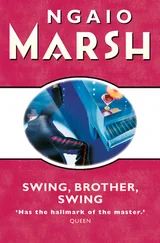“We’ve been along there, Mr. Fox.”
“Plumbing?”
“Not yet, Mr. Alleyn.”
“I’d try that next.” Alleyn pointed through the two open doors of Caesar Bonn’s office into the inner room. “Begin there,” he said.
He went alone into the restaurant. The table he and Troy had sat at was the second on the right. The chairs were turned up on its surface. He replaced one of them and seated himself. “For twenty years,” he thought, “I have trained my memory and trained it rigorously. This is the first time I have been my own witness in a case of this sort. Am I any good or am I rotten?”
Sitting alone there, he re-created his scene, beginning with small things: the white cloth, the objects on the table, Troy’s long hand close to his own and just within his orbit of vision. He waited until these details were firm in his memory and then reached out a little further. At the next table, her back towards him, sat Félicité de Suze in a red dress. She turned a white carnation in her fingers and looked sidelong at the man beside her. He was between Alleyn and the lamp on their table. His profile was rimmed with light. His head was turned towards the band dais. On his right, more clearly visible, more brilliantly lit, was Carlisle Wayne. In order to watch the performance she had swung round with her back half-turned to the table. Her hair curved back from her temples. There was a look of compassion and bewilderment in her face. Beyond Carlisle, with her back to the wall, a heavy shape almost obscured by the others, sat Lady Pastern. As they moved he could see in turn her stony coiffure, her important shoulders, the rigid silhouette of her bust; but never her face.
Raised above them, close to them, a figure gestured wildly among the tympani. This was a vivid picture because it was contained by a pool of light. Lord Pastern’s baldish head darted and bobbed. Metallic high lights flashed among his instruments. The spot light shifted and there in the centre of the stage was Rivera, bent backwards, hugging his piano-accordion to his chest. Eyes, teeth, and steel and mother-of-pearl ornament glittered. The arm of the metronome pointed fixedly at his chest. Behind, half-shadowed, a plump hand jerked up and down, beating the air with its miniature baton. A wide smile glistened in a moon face. Now Lord Pastern faced Rivera on the perimeter of the light pool. His revolver pointed at the contorted figure, flashed, and Rivera fell. Then the further shots and comic falls and then… In the deserted restaurant Alleyn brought his hands down sharply on the table. It had been then, and not until then, that the lights began their infernal blinking. They popped in and out down the length of the metronome and about its frame, in and out, red green, blue, green red. Then, and not until then, had the arm swung away from the prostrate figure and, with the rest of that winking stuttering bedazzlement, gone into action.
Alleyn got up and mounted the bandstand. He stood on the spot where Rivera had fallen. The skeleton tower of the metronome framed him. The reverse side of this structure revealed its electrical equipment. He looked up at the pointer of the giant arm which was suspended directly above his head. It was a hollow steel or plastic casting studded with miniature lights and for a moment reminded him fantastically of the jewelled dart. To the right of the band-room door and hidden from the audience by the piano, a small switchboard was sunk in the wall. Happy Hart, they had told Alleyn, was in charge of the lights. From where he sat at the piano and from where he fell to the floor he could reach out to the switches. Alleyn did so, now, pulling down the one marked “Motor.” A hidden whirring sound prefaced the first loud clack . The giant downward-pointing arm swept semi-circularly across, back, across and back to its own ratchet-like accompaniment. He switched on the lights and stood for a moment, an incongruous figure, motionless at the core of his kaleidoscopic setting. The point of the arm, flashing its lights, swept within four inches of his head and away and back and away again. “If you watched the damn’ thing for long enough I believe it’d mesmerize you,” he thought and turned off the switches.
Back in the offices he found Mr. Fox in severe control of two plumbers who were removing their jackets in the lavatory.
“If we can’t find anything fishing with wires, Mr. Alleyn,” Fox said, “it’ll be a case of taking down the whole job.”
“I don’t hold out ecstatic hopes,” Alleyn said, “but get on with it.”
One of the plumbers pulled the chain and contemplated the ensuing phenomena.
“Well?” said Fox.
“I wouldn’t say she was a sweetly running job,” the plumber diagnosed, “and yet again she works if you can understand me.” He raised a finger, and glanced at his mate.
“Trap trouble?” ventured his mate.
“Ar.”
“We’ll leave you to it,” Alleyn said and withdrew Fox into the office. “Fox,” he said, “let’s remind ourselves of the key pieces in this jig-saw atrocity. What are they?”
Fox said promptly: “The set-up at Duke’s Gate. The drug racket. Harmony . The substitution. The piano-accordion. The nature of the the weapon.”
“Add one more. The metronome was motionless when Rivera played. It started its blasted tick-tack stuff after he fell and after the other rounds had been fired.”
“I get you, sir. Yes,” said Fox, placidly, “there’s that too. Add the metronome.”
“Now, let’s mug over the rest of the material and see where we are.”
Sitting in Caesar Bonn’s stale office, they sorted, discarded, correlated and dissociated the fragments of the case. Their voices droned on to the intermittent accompaniment of plumbers’ aquatics. After twenty minutes Fox shut his notebook, removed his spectacles and looked steadily at his superior officer.
“It amounts to this,” he said. “Setting aside a handful of insignificant details, we’re short of only one piece.” He poised his hand, palm down, over the table. “If we can lay hold of that and if, when we’ve got it, it fits — well, our little picture’s complete.”
“If,” Alleyn said, “and when.”
The door of the inner office opened and the senior plumber entered. With an air of false modesty he extended a naked arm and bleached hand. On the palm of the hand dripped a revolver. “Would this,” he asked glumly, “be what you was wanting?”
Dr. Curtis waited for them outside the main entrance to Breezy’s flat.
“Sorry to drag you out, Curtis,” Alleyn said, “but we may need your opinion about his fitness to make a statement. This is Fox’s party. He’s the drug baron.”
“How do you expect he’ll be, Doctor?” Fox asked.
Dr. Curtis stared at his shoes and said guardedly: “Heavy hangover. Shaky. Depressed. May be resentful. May be placatory. Can’t tell.”
“Suppose he decides to talk, is it likely to be truthful?”
“Not very. They usually lie.”
Fox said: “What’s the line to take? Tough or coaxing?”
“Use your own judgement.”
“You might tip us the wink, though, Doctor.”
“Well,” said Curtis, “let’s take a look at him.”
The flats were of the more dubious modern kind, and brandished chromium steel almost in the Breezy Bellairs Manner — showily and without significance. Alleyn, Fox and Curtis approached the flat by way of a rococo lift and a tunnel-like passage. Fox pressed a bell and a plain-clothes officer answered the door. When he saw them he snibbed back the lock and closed the door behind him.
“How is he?” Alleyn asked.
“Awake, sir. Quiet enough, but restless.”
“Said anything?” Fox asked. “To make sense, I mean.”
Читать дальше






